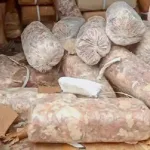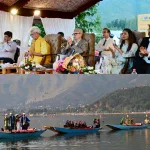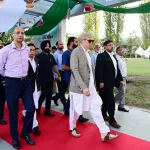The Deputy Chief Minister’s recent review meeting, where he is learnt to have issued directives to ensure quality work and blacklisting of non-performing contractors under schemes like NABARD, PMGSY, CRIF, and State Macadamisation programmes, reflects an important acknowledgment of public concern over infrastructure delivery. His stated commitment — to ensure timely completion, enforce quality benchmarks, and hold contractors accountable — is, in principle, laudable.
But the ground reality across Jammu and Kashmir paints a far more sobering picture. The problem is not merely of enforcement — it is rooted deeper in how projects are conceptualised, contracted, supervised, and funded [planning, monitoring and financing].
Despite repetitive high-level reviews, our roads collapse within months, bridges remain incomplete for years, and work gets routinely stalled due to payment delays, site disputes, or basic design failures etc. If the government is serious about quality infrastructure, it must stop blaming the last man in the chain — the contractor — and instead fix the systemic rot in contracts, planning, and institutional coordination, financing etc.
Faulty DPRs and Unrealistic Cost Estimations
Across both Jammu and Kashmir divisions, Detailed Project Reports (DPRs) remain a weak link. Many are mostly prepared without adequate topographic surveys, soil investigations, hydrological analysis, or field verification. Forest clearances or land acquisition are often applied for after tenders are floated. Such technical lapses lead to delays, disputes, or worse. Examples: “Bridge at Shrunz (NABARD), Vethpora Bridge without approaches, Gandabal Foot Bridge where 9 lives were lost due to delayed completion, Noorbagh Bridge which is still under construction as Land acquisition and other issues were pending so on.
The Deputy Chief Minister has rightly sought accountability for “design failures.” But unless the entire DPR process is independently prepared, vetted and modernised, these failures will keep repeating. The need of the hour is an engineering audit of sanctioned DPRs — not just of finished roads.
J&K’s Outdated SORs Undermine Realistic Budgeting
Another pressing concern that rarely finds space in official discourse is the inadequacy and regional misalignment of the Schedule of Rates (SOR) used in cost estimation for infrastructure projects.
In Jammu & Kashmir, a single, standardised SOR prepared by DIQC is often applied to vastly different geographies — whether mountainous terrains of PirPanjal, flood-prone Kashmir Valley, or plains of Samba and Kathua nor is analysis provided or part of SOR to allow regional balance like that of Standard Data Book(SBD) of MoRT&H. As a result:
- Costing does not account for logistical challenges in difficult terrains,
- Contractors face massive input cost mismatches,
- Projects either remain underfunded or are executed with substandard materials to stay within budget.
- Due to wrong budgeting make a director to State exchequer (Taxes) etc.
Even within the Public Works Department (PWD), divisions executing similar schemes under different financial institutions — NABARD, CRIF, PMGSY, or World Bank — do not apply harmonised SORs, creating inconsistencies and disputes in payments and approvals. The failure to revise and regionalise the SOR as per local conditions and upgraded mechanism has directly contributed to cost underestimation, abandonment of sites, and financial stress on executing agencies as also loss to state exchequer.
Coordination Collapse and Legal Gaps in Contracts
There’s a widening disconnect between contractors, engineering wings, and administrative departments. Many contractors receive work orders only to find sites not handed over, utilities not shifted, or payments not scheduled. Meanwhile, the contract documents is so poorly drafted that it does not match any legally balanced standards like FIDC, EPC Agreement of MoRT&H and so on:
- Time extensions require cumbersome bureaucratic approvals,
- Compensation for force majeure events (like landslides or shutdowns) and Employer’s failure is absent,
- No mechanism exists to recover escalation in prices of bitumen, steel, or cement or even the taxes revisions as mad by Government itself.
In such conditions, holding contractors solely responsible is unjust — especially when the government itself is in breach of its payment timelines or site readiness obligations. If the Government &/ Deputy CM wishes to “blacklist” non-performers, Government must first ensure that the state complies with its contractual and financial obligations, as per legally binding frameworks of public procurement. However, at the same time Contractors not performing professionally can’t be exonerated as well.
Reform Can’t Wait — Our Roads DeserveTo Be Better Than How They Are
I as a member of the Congress Party and a citizen of J&K strongly support durable, inclusive infrastructure development across J&K. But slogans and statements are no substitute for reform.
I propose the following correctives with urgent priority:
- DPR preparation and Vetting by Independent Technical Panels, a specific/specialized Division within PWD be created.
- Revision and Regionalisation of SORs, ensuring cost estimates match geographical realities like Standard Rate Analysis Mechanism by MoRT&H and MoRD etc.
- Transparent, Escrow-Based Payment Systems to safeguard contractors cash flow and maintain site momentum.
- Digital Project Tracking Dashboards with geo-tagging, real-time inputs, and public access.
- More importantly a Standardised and Legally Robust Contracts with dispute resolution mechanisms, compensation clauses, and equitable risk allocation like FIDIC, EPC Agreement of Government to make sincere efforts in this regard.
Conclusion
The Government/Deputy CM’s words at Jammu must translate into systemic action across all of Jammu and Kashmir. Without fixing the design, documentation, and delivery framework, these announcements will remain yet another entry in minutes of meetings with no tangible results for public good.
The people of J&K don’t want blacklists and blame games. They want roads that last, bridges that connect, and systems that work to make villages, towns and cities happy and prosperous— not just on paper, but on the ground. I conclude with John F. Kennedy “America’s roads are good not because America is rich. America is rich because of its good roads”
Therefore, people of J&K expect good Governance, Good roads and Bridges i.e. connectivity to see development and prosperity reach every Nook and corner of J&K.
(The Author is member of the Congress Party (INC) and Policy Analyst from J&K. Feedback: [email protected])








